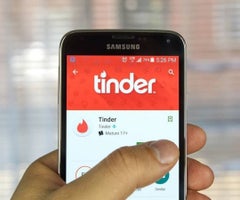MI SELECCIÓN DE NOTICIAS
Noticias personalizadas, de acuerdo a sus temas de interés

Match Group, the parent of Tinder, is taking a stake in Noonlight, an app that tracks the location of users and notifies authorities in the event of safety concerns.
Dating app’s partner will send police if users feel threatened; company says many are comfortable with the privacy trade-off
Tinder wants to allow users to send out an alarm when bad dates turn really ugly.
The popular dating app plans to start offering users an option to hit a panic button, receive check-ins to make sure they feel safe, and even summon authorities to their location.
To offer the service, Tinder parent company Match Group Inc. MTCH -1,57% is taking a stake and board seat in an app called Noonlight that tracks the location of users and notifies authorities in the event of safety concerns. Tinder plans to debut the feature free for U.S. users at the end of January, and Match Group plans to roll it out to its other dating apps in coming months.
Match Group didn’t disclose the size of the investment.
The company has been criticized at times for not doing more to screen out bad actors, often in the wake of reports of sexual assaults and other crimes that result from connections made through the apps.
Tinder’s move shows how some online platforms are investing more in the physical safety of users, while also highlighting the privacy trade-offs that often entails.
“You should run a dating business as if you are a mom,” said Match Group Chief Executive Mandy Ginsberg, who has a 21-year-old daughter. “I think a lot about safety, especially on our platforms, and what we can do to curtail bad behavior. There are a lot of things we tell users to do. But if we can provide tools on top of that, we should do that as well.”
Uber Technologies Inc., Airbnb Inc., and Care.com Inc. are among the online platforms that have struggled with safety issues and in recent months announced extra measures to address them.
The investment in Noonlight marks the first step Tinder is taking to monitor the real-time safety of its users after they connect on the platform and meet for coffee or drinks. Previously Tinder’s safety efforts focused on monitoring how users communicated with one another, employing moderators and machine learning to detect abusive language and photos.
When Tinder launches the Noonlight tool, users will be able to add a badge to their dating profiles. “I liken this to the lawn sign from a security system,” said Elie Seidman, Tinder’s CEO. “It tells people I am protected, and that is a deterrent.”
Ahead of dates, users will be able to log information such as the time and details about the other person. Then if they trigger an alert, Noonlight can share the information, along with the user’s real-time location, with authorities.
That process involves users giving Noonlight permission to track their locations throughout a date, though Ms. Ginsberg said Match Group has determined many people are comfortable with that trade-off. “You are opting in to make sure people can help you if you are in need,” she said.
Ms. Ginsberg said the location data won’t be used for marketing or anything else. Noonlight won’t transfer location information to Match Group, she said.
Another potential snag: false positives, such as if users accidentally trigger false alarms that summon police during a date that is actually going well.
“The false positives, believe me, we took them into account,” Ms. Ginsberg said. “If someone doesn’t respond, worst case someone shows up and knocks on the door. It’s not the worst thing in the world.”
When an alarm is triggered, Noonlight instructs users to enter a code. If they don’t enter it, they’ll immediately receive a text from one of Noonlight’s dispatchers. If they don’t respond to that text, Noonlight attempts to call them. If there is no answer, or if it is answered confirming they need help, then Noonlight dispatches emergency services.
Tinder is one of the most popular dating apps in the world, with more than 50 million global users and more than 5 million paying subscribers, and Match Group runs a stable of other brands in the field.
Match Group’s dating apps don’t provide background checks of all users, although when the apps identify sex offenders, they are banned from all the company’s platforms, Ms. Ginsberg said. Part of the reason Match Group doesn’t check all users, Ms. Ginsberg said, is because the company’s free dating apps such as Tinder don’t require users to submit a first and last name and billing address, which are used for identifying sex offenders. Additionally, as more people sign up for the apps through Google and Apple, apps like Tinder don’t have a direct relationship with the user, she said.
Tinder next plans to roll out a verification system that it is currently testing which would require users to prove they actually look like the photos they submit. The tool asks users to take pictures in certain poses, such as with their thumbs up, and compares the photos to the images in their profiles. Tinder gives blue verification badges to users if the photos match.
Looking ahead, Ms. Ginsberg said Match Group may identify more safety businesses to partner with or potentially acquire.
“I hate to answer the question about is it ever enough, because it never will be,” she said. “We should always strive to do more.”
By Georgia Wells
El aumento contrasta con una caída de 0,3% en el índice Msci Asia Pacific, afectado por los débiles datos económicos provenientes de China
La moneda común cayó 0,4% a US$1,03, su nivel más bajo desde noviembre de 2022, ampliando su caída desde finales de septiembre a alrededor de 8%
El país que más subió el salario mínimo para sus habitantes fue México. El Gobierno liderado por la presidente Claudia Sheinbaum aumentó 12% la cifra